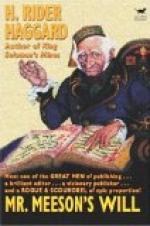“I was surprised to see you yesterday,” she said. “How did you know we were coming?”
Eustace told her that he had seen it in the Globe. “I am sure you cannot have been so surprised as I was,” he went on, “I had made sure that you were drowned. I went up to Birmingham to call on you after you had gone, and found that you had vanished and left no address. The maid-servant declared that you had sailed in a ship called the ’Conger Eel’—which I afterwards found out was Kangaroo. And then she went down; and after a long time they published a full list of the passengers and your name was not among them, and I thought that after all you might have got off the ship or something. Then, some days afterwards, came a telegram from Albany, in Australia, giving the names of Lady Holmhurst and the others who were saved, and specially mentioning ’Miss Smithers—the novelist’ and Lord Holmhurst as being among the drowned, and that is how the dreadful suspense came to an end. It was awful, I can tell you.”
Both of the young women looked at Eustace’s face and saw that there was no mistaking the real nature of the trial through which he had passed. So real was it, that it never seemed to occur to him that there was anything unusual in his expressing such intense interest in the affairs of a young lady with whom he was outwardly, at any rate, on the terms of merest acquaintance.
“It was very kind of you to think so much about me,” said Augusta, gently. “I had no idea that you would call again, or I would have left word where I was going.”
“Well, thank God you are safe and sound, at any rate,” answered Eustace; and then, with a sudden burst of anxiety, “you are not going back to New Zealand just yet, are you?”
“I don’t know. I am rather sick of the sea just now.”
“No, indeed, she is not,” said Lady Holmhurst; “she is going to stop with me and Dick. Miss Smithers saved Dick’s life, you know, when the nurse, poor thing, had run away. And now, dear, you had better tell Mr. Meeson about the will.”
“The will. What will?” asked Eustace.
“Listen, and you will hear.”
And Eustace did listen with open eyes and ears while Augusta, getting over her shyness as best she might, told the whole story of his uncle’s death, and of the way in which he had communicated his testamentary wishes.
“And do you mean to tell me,” said Eustace, astounded, “that you allowed him to have his confounded will tattooed upon your neck?”
“Yes,” answered Augusta, “I did; and what is more, Mr. Meeson, I think that you ought to be very much obliged to me; for I daresay that I shall often be sorry for it.”
“I am very much obliged,” answered Eustace; “I had no right to expect such a thing, and, in short, I do not know what to say. I should never have thought that any woman was capable of such a sacrifice for—for a comparative stranger.”




